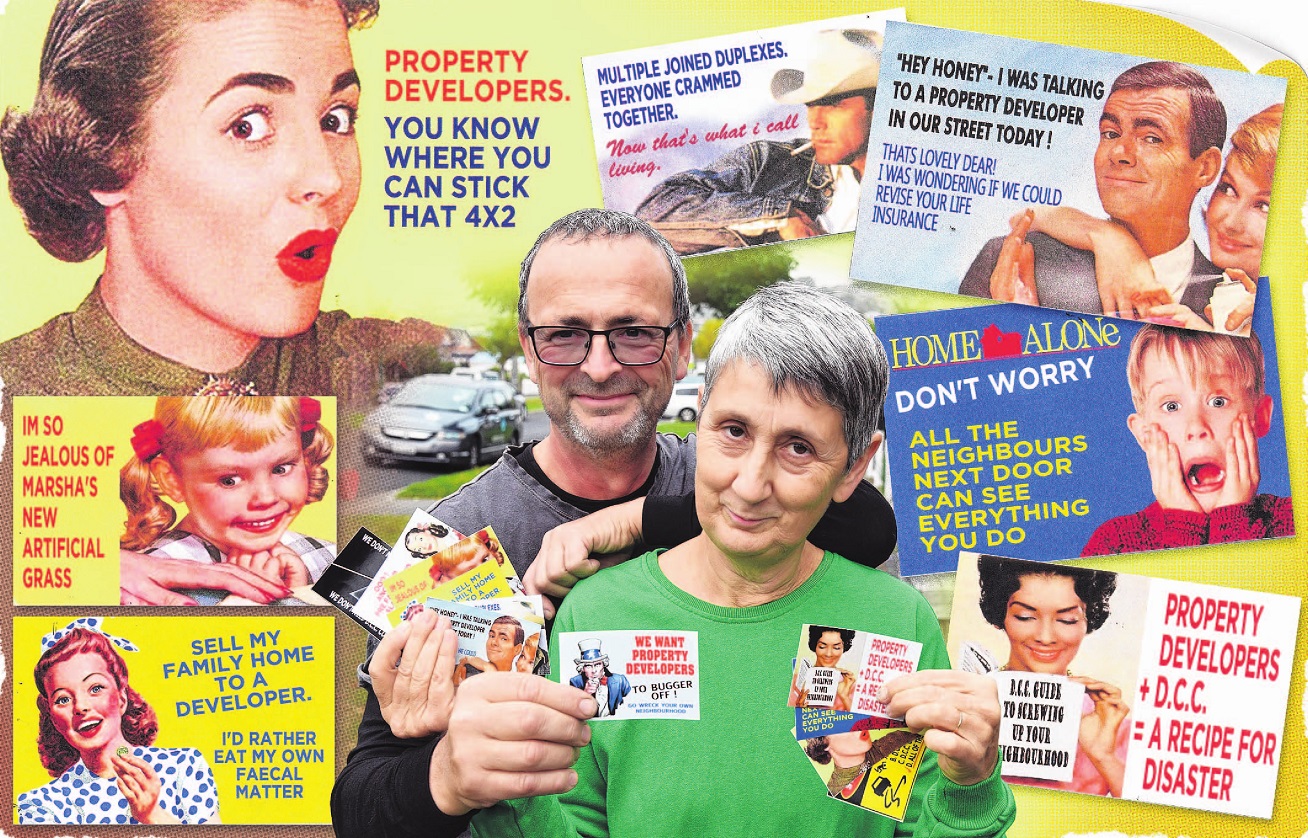
The stickers, made by frustrated Rawhiti St residents, directed criticism at both the Dunedin City Council and developers for the new developments, which have shot up in streets nearby.
One sticker read: "Property developers + DCC = a recipe for disaster".
Another read: "Sell my family home to a developer? I’d rather eat my own faecal matter".
Rawhiti St, in Musselburgh, is lined with family homes on large sections with gardens and trees.
Resident Graeme Franklyn and 40 other residents had objected earlier this year to a draft council plan that would allow more intensive development in the street and in others nearby.
They said it would reduce space for nature and occupy ground that would soak up rain. They said townhouses were "ugly concrete pads that simply result in water running off" and other solutions should be found, including converting existing buildings in the city centre into apartments.
Neighbouring South Dunedin is predicted to suffer increasingly from emerging groundwater during intense rain events due to climate change.
Housing intensification would result in streets becoming less desirable, families moving away, lower house prices and ruination of the "strong sense of community", the residents said.
The residents also feared that old pipes in the area would not support more people. Mr Franklyn showed the ODT a pile of sewage that had bubbled up and not been cleared away from a garden backing on to his section.
A report by council officials has subsequently recommended that Rawhiti St and neighbouring streets, and Wakari, should be removed from the council’s housing intensification plans in its Future Development Strategy.
Mr Franklyn said the stickers were tongue in cheek.
"They are a way of dealing with the frustration of developers coming into the area."
He was optimistic following the news of the council officials’ report and looked forward to a final decision and "getting out the barbecue and having a few beers on the street".
Neighbours Angela and Ian Formston, who produced the stickers and have lived on the street for 19 years, were worried about property values dropping if townhouses were built here.
They had wanted to build a big deck but temporarily "lost their mojo due to the sword of Damocles hanging over them".
Neighbour Margaret Kennedy, 73, said it was important to "have trees and be able to look out the window and see the birds".
The local schools meant there should be families living here, rather than developers "putting up things for young married couples who can afford very high rents with a view to moving on in a few years’ time".
Co-owner of townhouse developer TGC Homes George Hercus said he relied on the council to make the right decisions about where his company was allowed to build while acknowledging it could be a "juggling act" for the council to balance the need for more homes and nature.
"It’s no skin off our back where housing is intensified as long as it meets the needs of population growth and creates access to green spaces for everyone."
Townhouse developer Blue Sky Property Group director Lyndon Fairbairn declined to comment.
A council spokesperson said the South Dunedin Future programme was working towards a plan that will likely feature "the development of more climate resilient housing".
MP for Taieri Ingrid Leary said it was understandable that residents were stressed as the plan for South Dunedin was not yet complete.
"Like most communities we urgently need homes to overcome the housing shortage.
"However, it’s natural for homeowners to feel anxious that the character of their neighbourhoods might change, especially when there doesn’t seem to be a vision for the area."














